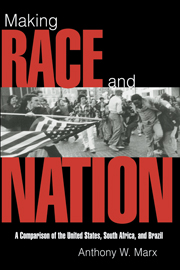Book contents
- Frontmatter
- Contents
- Preface and Acknowledgments
- 1 Introduction
- Part One Historical and Cultural Legacies
- 2 Trajectories from Colonialism
- 3 Lessons from Slavery
- 4 The Uncertain Legacy of Miscegenation
- Implications
- Part Two Racial Domination and the Nation-State
- Part Three Race Making from Below
- Notes
- Bibliography
- Index
2 - Trajectories from Colonialism
Published online by Cambridge University Press: 05 June 2012
- Frontmatter
- Contents
- Preface and Acknowledgments
- 1 Introduction
- Part One Historical and Cultural Legacies
- 2 Trajectories from Colonialism
- 3 Lessons from Slavery
- 4 The Uncertain Legacy of Miscegenation
- Implications
- Part Two Racial Domination and the Nation-State
- Part Three Race Making from Below
- Notes
- Bibliography
- Index
Summary
How did differing experiences of colonialism and its aftereffects shape later racial orders? I begin with an examination of Brazil, where arguments for such historical determinacy have been employed to explain the later lack of racial domination. To check such arguments, I then turn to comparisons with the colonies that would become South Africa and the United States.
Portuguese Brazil
The image of a Portuguese colonial legacy of racial tolerance is tantamount to an official ideology, at least within the former colonial power. Modern Portuguese officials have claimed that among Europeans, their predecessors “alone practiced the principle of multi-racialism, which all now consider the most perfect and daring expression of human brotherhood … in which men are limited only by their ability.” As early as 1923, the usually astute W. E. B. Du Bois agreed that “between the Portuguese and the African and the near-African there is naturally no racial antipathy – no accumulated historical hatreds, dislikes and despisings.” According to Gilberto Freyre, the leading advocate of this thesis, “the absence of violent rancors due to race constitutes one of the peculiarities of the feudal system in the tropics,” characteristic of Portuguese rule. In their colonies, the Portuguese supposedly pursued policies of incorporation more than imposition, consistent with a “plasticity of the national character, of its classes and institutions, which are never indurated or definitely stratified.”
- Type
- Chapter
- Information
- Making Race and NationA Comparison of South Africa, the United States, and Brazil, pp. 29 - 46Publisher: Cambridge University PressPrint publication year: 1997

